Posted on Tuesday 24 November 2009

| It Is Only a Paper Moon [1933]
|
| Mmm, mm, mm, mm A bubble for a minute Mmm, mm, mm, mm You smile, the bubble has a rainbow in it |
| Say, it’s only a paper moon Sailing over a cardboard sea But it wouldn’t be make-believe If you believed in me… |
In the last year, we’ve learned a lot about "financial bubbles" – situations where values in some Market become inflated and there’s a rush to commerce. Values artificially soar until an inevitable point of absurdity – and then they plummet. Another way to think about financial bubbles is by pondering Alan Greenspan’s term, Irrational Exuberance. Robert Shiller used the quote for a book title, a book about financial bubbles. It’s a version of those situations where the promise of short term gain overwhelms rational long term planning.
 I suppose the paradigm is the Gold Rush mentality that recurrently gripped our country in the 19th century. Hordes of people threw caution to the wind on hearing of a Gold Strike, sold everything they owned, and headed for the Wilderness. A Gold find in Georgia was the stimulus for the Trail of Tears. Custer’s expedition into the Black Hills found Gold and was, in part, responsible for his "Last Stand" and the later Lakota massacre at Wounded Knee. There were thousands of broken lives after Gold was found in California and in the Klondike.
I suppose the paradigm is the Gold Rush mentality that recurrently gripped our country in the 19th century. Hordes of people threw caution to the wind on hearing of a Gold Strike, sold everything they owned, and headed for the Wilderness. A Gold find in Georgia was the stimulus for the Trail of Tears. Custer’s expedition into the Black Hills found Gold and was, in part, responsible for his "Last Stand" and the later Lakota massacre at Wounded Knee. There were thousands of broken lives after Gold was found in California and in the Klondike.
 The Stock Market Crash in 1929 was such a phenom. In the roaring twenties, America discovered the Stock Market and turned it into a gambling casino, ultimately breaking the bank and ushering in a time of unequaled hardship – the 1930s. That Crash was a financial bubble that effected the whole stock market. In our recent history, we’ve had three financial bubbles that afflicted a specific market sector. The "Internet Bubble" came first. When people realized the potential of the Internet, any company involved soared in value. Pretty soon, Internet Companies were being created and sold before they even started operating. Then came the "Housing Bubble." It was more complicated. Financial Deregulation created a situation where risk itself could be traded and a complex system developed that treated mortgages [virtual money] as if it were real money. The collapse of that bubble continues to devastate our economy. The same thing happened with the "Oil Bubble" a bit later. A year ago, our entire market fell, and brought up specters of the 1929 Crash [still does, as a matter of fact]. This notion of the promise of short term reward or solutions overwhelming rational long term thinking is such a feature of human life that we ought to have a Bureau in the government to look out for it – The Ministry of Bubble Detection or The Ponzi Prevention Administration.
The Stock Market Crash in 1929 was such a phenom. In the roaring twenties, America discovered the Stock Market and turned it into a gambling casino, ultimately breaking the bank and ushering in a time of unequaled hardship – the 1930s. That Crash was a financial bubble that effected the whole stock market. In our recent history, we’ve had three financial bubbles that afflicted a specific market sector. The "Internet Bubble" came first. When people realized the potential of the Internet, any company involved soared in value. Pretty soon, Internet Companies were being created and sold before they even started operating. Then came the "Housing Bubble." It was more complicated. Financial Deregulation created a situation where risk itself could be traded and a complex system developed that treated mortgages [virtual money] as if it were real money. The collapse of that bubble continues to devastate our economy. The same thing happened with the "Oil Bubble" a bit later. A year ago, our entire market fell, and brought up specters of the 1929 Crash [still does, as a matter of fact]. This notion of the promise of short term reward or solutions overwhelming rational long term thinking is such a feature of human life that we ought to have a Bureau in the government to look out for it – The Ministry of Bubble Detection or The Ponzi Prevention Administration.

One of the things that Robert Shiller says about financial bubbles is that during their upswing, people just don’t recognize what’s happening. You can actually see that on the Internet. Before the Housing Bubble burst, there are all kinds of articles arguing that the absurd escalation in house values was rational. There’s an article by Nobel Winner Paul Krugman denying outright that the outlandish gas prices weren’t a sign – "But let’s drop all the talk about an oil bubble," he said. Whether that’s wishful thinking or something else isn’t clear, but it’s a solid observation: A bubble isn’t a bubble until it bursts.
The Mother of all Bubbles?
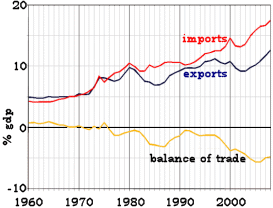 I spent the weekend periodically poking around in our International dealings over the Bush Years. We know that part of the problem with our financial recovery has to do with jobs. So many have been outsourced that one wonders where the jobs we need will come from. The Balance of Trade doesn’t look so hot either. Looks like we’re much better customers than suppliers. But the one that really grabbed me was something called the Net International Investment Position [NIIP]. What I found out was that almost all of our recently worsening position was
I spent the weekend periodically poking around in our International dealings over the Bush Years. We know that part of the problem with our financial recovery has to do with jobs. So many have been outsourced that one wonders where the jobs we need will come from. The Balance of Trade doesn’t look so hot either. Looks like we’re much better customers than suppliers. But the one that really grabbed me was something called the Net International Investment Position [NIIP]. What I found out was that almost all of our recently worsening position was 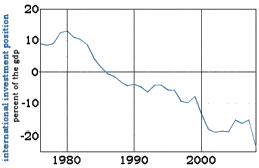 from selling Treasuries to foreign governments. Maybe all of you knew that, but I didn’t. Then I started trying to figure out how much of our National Debt was foreign owned. That turned out to be a more difficult task than I imagined because of the complex way our debt is structured. I was finally able to create a graph that showed how much of the Publicly Held National Debt was foreign owned, back to 1986. It was all I could take on a rainy Sunday, so I watched some football and one of those British Mysteries. Here’s the graph again:
from selling Treasuries to foreign governments. Maybe all of you knew that, but I didn’t. Then I started trying to figure out how much of our National Debt was foreign owned. That turned out to be a more difficult task than I imagined because of the complex way our debt is structured. I was finally able to create a graph that showed how much of the Publicly Held National Debt was foreign owned, back to 1986. It was all I could take on a rainy Sunday, so I watched some football and one of those British Mysteries. Here’s the graph again:
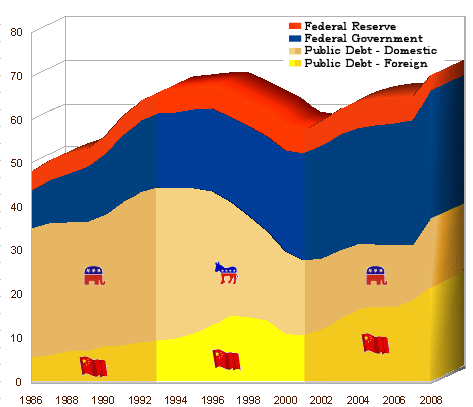
[This is a conservative estimate. There’s another more disturbing estimate here]
The United States government is financing its more than trillion-dollar-a-year borrowing with i.o.u.’s on terms that seem too good to be true. But that happy situation, aided by ultralow interest rates, may not last much longer. Treasury officials now face a trifecta of headaches: a mountain of new debt, a balloon of short-term borrowings that come due in the months ahead, and interest rates that are sure to climb back to normal as soon as the Federal Reserve decides that the emergency has passed.
Even as Treasury officials are racing to lock in today’s low rates by exchanging short-term borrowings for long-term bonds, the government faces a payment shock similar to those that sent legions of overstretched homeowners into default on their mortgages. With the national debt now topping $12 trillion, the White House estimates that the government’s tab for servicing the debt will exceed $700 billion a year in 2019, up from $202 billion this year, even if annual budget deficits shrink drastically. Other forecasters say the figure could be much higher.
In concrete terms, an additional $500 billion a year in interest expense would total more than the combined federal budgets this year for education, energy, homeland security and the wars in Iraq and Afghanistan. The potential for rapidly escalating interest payouts is just one of the wrenching challenges facing the United States after decades of living beyond its means.
The surge in borrowing over the last year or two is widely judged to have been a necessary response to the financial crisis and the deep recession, and there is still a raging debate over how aggressively to bring down deficits over the next few years. But there is little doubt that the United States’ long-term budget crisis is becoming too big to postpone…
 The article comes with a graphic showing our ballooning debt. The article make the analogy with the Housing Bubble [which well it should]. It’s about our impossible debt and how the Treasury Department is scrambling to restructure it. It has phrases like "a mountain of new debt," "a balloon of short-term borrowings," "wrenching challenges" and "long-term budget crisis." Sounds like a bursting Financial Bubble to me. My read on things right now is that Bush cut taxes in order to be loved by his base; started an expensive war to be loved by the neoconservatives; financed it all by massive borrowing from foreign governments [so Americans wouldn’t ‘feel it’]; ignored the inevitable Recession resulting from inattention to our economy [and Greenspan’s sleight of hand]; and left us with a bursting governmental financial bubble that should send us to the poor-house. The only thing in our favor is that, like Goldman-Sachs, we’re simply "too big to fail." Short term problem solving with no attention to the long term consequences. Irrational Exuberance at its worst [and it isn’t make-believe]…
The article comes with a graphic showing our ballooning debt. The article make the analogy with the Housing Bubble [which well it should]. It’s about our impossible debt and how the Treasury Department is scrambling to restructure it. It has phrases like "a mountain of new debt," "a balloon of short-term borrowings," "wrenching challenges" and "long-term budget crisis." Sounds like a bursting Financial Bubble to me. My read on things right now is that Bush cut taxes in order to be loved by his base; started an expensive war to be loved by the neoconservatives; financed it all by massive borrowing from foreign governments [so Americans wouldn’t ‘feel it’]; ignored the inevitable Recession resulting from inattention to our economy [and Greenspan’s sleight of hand]; and left us with a bursting governmental financial bubble that should send us to the poor-house. The only thing in our favor is that, like Goldman-Sachs, we’re simply "too big to fail." Short term problem solving with no attention to the long term consequences. Irrational Exuberance at its worst [and it isn’t make-believe]…Obama in China highlights total failure of conservative vision
– if you know how to see
Open Left
By Paul Rosenberg
November 22, 2009Bush’s tax cuts & "free market/free trade" policies were supposed to turbo-charge America’s economy, while the neo-conservative foreign policy laid out by the Project for a New American Century in "Rebuilding America’s Defenses" was supposed to be a blueprint for extending American hegemony across the globe, indefinitely, with the containment and subordination of China as a key strategic goal. Conveniently, those lofty promises of yesteryear have been entirely forgotten. Otherwise it would have been impossible to cover Obama’s recent visit to China without starkly confronting the utter failure of conservative ideology, given its first unfettered shot at power since the 1920s, when it brought us the Great Depression…
In summary, the neo-cons never even saw the terrorist coming. They were taken completely by surprise, and now insist the Obama must continue on the doomed path of failure that they have constructed…not even thinking about the number one challenge that they themselves were obsessed with before getting blind-sided by al Qaeda. Is there any way to even begin to grasp how utterly foolish this state of affairs is? There are people in lunatic asylums who deserve to be taken more seriously than this sorry crowd of losers. It’s just that simple. Conservatism as an ideology has failed as utterly and completely as Soviet Communism. It’s time to toss it onto the dust heap of history, before America itself winds up there.
This is actually an article about China, but I loved the opening and closing so much that I left out the middle altogether. With Glen Beck organizing a march to the Lincoln Memorial on MLK day and Sarah Palin speeding about on her bus tour, I needed a shot of rational thinking.
|
con·ser·va·tism \kÉ™n-ˈsÉ™r-vÉ™-ËŒti-zÉ™m\
noun
1832
|
I don’t understand what Conservatism really means. Maybe I never did. One thing I do know is that Conservative people have some shared understanding because, on meeting, they seem to recognize each other immediately. I’m not sure that’s true on the other side of the fence.
There’s another thing that characterizes Conservatives – negation. It’s apparent in that definition quoted above: no taxes, no regulation, no social welfare. The part about the military is one of the few positives and bears further scrutiny.
 The piece of Conservatism that has my attention right now is in Paul’s comments: "Conservatism as an ideology has failed as utterly and completely as Soviet Communism." That’s obviously true, but that doesn’t seem to bother them at all. If anything, it seems to have inspired them. A corollary to these last two points is that they seem to do best when they’re out of power. The twenty years of Reagan, Bush I, and Bush II have been disastrous failures by any criteria, but it doesn’t seem to upset any of them [come to think of it, that Nixon fellow wasn’t so hot either].
The piece of Conservatism that has my attention right now is in Paul’s comments: "Conservatism as an ideology has failed as utterly and completely as Soviet Communism." That’s obviously true, but that doesn’t seem to bother them at all. If anything, it seems to have inspired them. A corollary to these last two points is that they seem to do best when they’re out of power. The twenty years of Reagan, Bush I, and Bush II have been disastrous failures by any criteria, but it doesn’t seem to upset any of them [come to think of it, that Nixon fellow wasn’t so hot either].
There’s something about morality in all of this that’s very confusing to me. While they generally loudly taut moralities of various kinds [the abortion, stem cell, homosexuality thing], they don’t practice it very well [Watergate, Iran/Contra, Dirty Tricks, Abramoff, CIA Leak, prewar intelligence, ignoring FISA, etc]. I’m not so sure what you call that, but it looks like self-righteousness ["if you do it, it’s horrid, but if I do it, it’s expedient"].
 I’ve been thinking about how the military business fits in there. On the face of it, it makes little sense. They preach fiscal conservatism and oppose taxation and spending, yet they seem to go for any military program or junket that comes along. I think it must be about power. In politics, in foreign policy – power is the point. Once they get it, they don’t seem to know what to do with it.
I’ve been thinking about how the military business fits in there. On the face of it, it makes little sense. They preach fiscal conservatism and oppose taxation and spending, yet they seem to go for any military program or junket that comes along. I think it must be about power. In politics, in foreign policy – power is the point. Once they get it, they don’t seem to know what to do with it.
|
con·ser·va·tism \kÉ™n-ˈsÉ™r-vÉ™-ËŒti-zÉ™m\
noun
[see also The Myth of Sisyphus]
|
Widening a growing rift, Rep. Patrick J. Kennedy, a Rhode Island Democrat, said on Sunday that the Roman Catholic bishop of Providence had instructed him to refrain from receiving communion because of the congressman’s stance on abortion. Rep. Kennedy said that Bishop Thomas J. Tobin “instructed me not to take communion and said that he has instructed the diocesan priests not to give me communion,” according to The Providence Journal, which first reported the article.
But Michael K Guilfoyle a spokesman for the diocese, said Sunday that the Bishop has “never addressed matters relative to public officials receiving Holy Communion with pastors of the Diocese of Providence.” The Bishop added that his instructions to Rep. Kennedy came more than two years ago in a letter on February 21, 2007, he sent to the congressman privately and pastorally.
“In light of the Church’s clear teaching, and your consistent actions,” the letter said, “I believe it is inappropriate for you to be receiving Holy Communion and I now ask respectfully that you refrain from doing so.” The Bishop added that he was surprised that Rep. Kennedy had chosen to reopen the public discussion of the faith just two weeks after he told reporters he would no longer discuss these matters publicly.
The allegation by Rep. Kennedy, a Democrat in his eighth term, is the most recent escalation in a bitter and unusually personal dispute between the men that began after the lawmaker criticized the nation’s Catholic bishops for threatening to oppose an overhaul of the health care system unless it tightened restrictions on publicly financed abortion…
… According to the National Catholic Reporter, Cardinal Sean O’Malley, the archbishop of Boston, once urged Catholic officials who support abortion rights to refrain from Communion. But the newspaper said Cardinal O’Malley did not order Boston priests to deny them the sacrament. Kerry and the late Massachusetts Sen. Edward M. Kennedy (Patrick Kennedy’s father and another supporter of abortion rights) both received Communion at Cardinal O’Malley’s installation as archbishop in 2003. In 2004, a large majority of bishops “tried to persuade the minority not to do this — using Communion as a weapon,” Father Reese said, but the conference could not come to a consensus view on the issue.
Orders by bishops to deny Communion to Catholic public officials are very unusual but not unprecedented. In 2003, another prominent Catholic Democrat with a mixed voting record on abortion, Rep. David Obey of Wisconsin, was admonished not to take Communion in his congressional district by Bishop Raymond Burke of LaCrosse. Spokeswoman McQuade said the bishops conference could not give a count of how many times bishops have actually denied Communion to government officials. But a review of news accounts of the past two decades suggests that public impositions of the penalty are very uncommon. These are among the high-profile instances in contemporaneous news stories: a Sacramento bishop told Gray Davis not to take Communion when he was Democratic governor of California in 2003; in 2004, then-Gov. James McGreevey, of New Jersey, complied with the admonitions of three of the state’s bishops that he not take Communion…
Father Reese stressed that withholding Communion is not as grave a penalty as excommunication, which separates a Catholic from all the sacraments. If a bishop denies Communion to a Catholic, he or she “is still a Catholic,” Father Reese said. Indeed, he said “it would take a canon lawyer” to say whether a Catholic denied Communion in his own diocese would be free to receive Communion elsewhere…
There make be a back story that explains all of this. Kennedy is an on-again off-again recovering alcoholic/drug addict and has had several high profile brushes with the law. Maybe Bishop Tobin is reacting to those stories. But perhaps Bishop Tobin is just another self-righteous religious leader who has an inflated view of his position in the church, and is bent on spreading Catholic Morality outside of his pulpit.
Population control is the top issue for the U.S. [and most other countries in the world]. It’s hard to imagine that Bishop Tobin can believe that caring for the people of the earth [and the earth itself] by limiting our numbers is grounds for expelling anyone from the Church. Is his loyalty to the God he believes created us, or to the idiosyncratic beliefs of the men of the Catholic Church?
I just read Kennedy Barred From Communion by Bishop in the New York Times. Then I went to your web site and read:
In his first encyclical as our Holy Father, Pope Benedict XVI, has written a very important and beautiful treatise called Deus Caritas Est, or God is Love. This encyclical focuses on God’s love for us and our responsibility as a Christian community to share that love with one another. The Pope writes, “Love of neighbor, grounded in love of God, is first and foremost a responsibility of each individual member of the faithful, but is also a responsibility of the entire Church at every level.” Through this letter we are reminded of God’s true love for us and are called to keep His redemptive work alive and active in our world.I am a retired Psychoanalyst and Psychiatrist. In my profession, I learned that my mind was never infallible and that there were more times than I liked where some personal glitch, some piece of my own psychological story, interfered with my mental clarity. Over the years, I learned lots of tricks to help me know when it was time to take a look inside, maybe even get some help from a colleague. When I read this story, particularly these quotes below, I found myself thinking that if were I Bishop Tobin, I’d take a very long walk and try to figure out my part in the absurd exchanges I was having with Representative Patrick Kennedy. I might even read Deus Caritas Est, or God is Love first, and then take that walk.
- In response, Bishop Tobin rebuked Mr. Kennedy, accusing him of “false advertising” for describing himself as a Catholic.
- ”If you freely choose to be a Catholic, it means you believe certain things, you do certain things,” Bishop Tobin said at the time.
- “If you cannot do all that in conscience, then you should perhaps feel free to go somewhere else.”
- “In light of the Church’s clear teaching, and your consistent actions,” the letter said, “I believe it is inappropriate for you to be receiving Holy Communion and I now ask respectfully that you refrain from doing so.”
They don’t sound like the words of a Bishop who is thinking right. I can assure you that any psychologically or spiritually informed person reading that article would likely reach the same conclusion. There’s more here than meets the eye and it doesn’t seem that you know it. Sorry to be so free with the unsolicited advice. I expect the person screening this email won’t pass it along, but on the odd chance that you see it, my motive in writing it is, in-so-far-as-I know-it, benevolent…
It’s generally broken down into three components – a small piece held by the Federal Reserve [red], a growing intergovernmental piece held by the Federal Government [blue], and the piece held by the Public [yellow] primarily in the form of Treasury Securities.
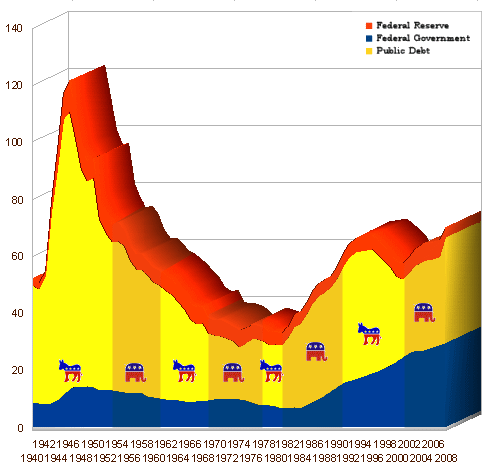
The debts held by the Federal Government [blue] are the entitlement programs [eg Social Security] which are a problem unto themselves. It’s what people mean when they frown and say, "We’ve got to do something about Social Security and Medicare." The GAO projects that with the accumulating interest, this portion will exceed all government revenue in 25 years]. It’s imponderable so I’ll move on [redrawing the graph so that part won’t show so much].
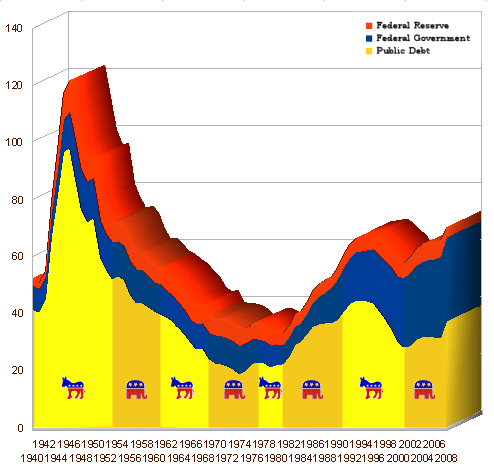
If there’s a hero in this story, it’s President Bill Clinton [though he floundered on the personal character front]. With a mild tax increase, welfare reform, and cuts in Military Spending , he dramatically decreased the Public Debt, though the Federal Debt continued unabated [upper graph]. And then came President George W. Bush and Vice President Dick Cheney. Their constituents were the same ones President Reagan had courted [the wealthy]. So they cut taxes taxes [several times]. And then they marched us off to war in Afghanistan, and followed that with an unprovoked invasion of Iraq for good measure. Expensive enterprises, War. While it appears they were gentler on the National Debt until the recent financial crash than their mentor, President Reagan, they did their own damage in another way that’s less apparent.
This data in this next graph was really hard to come by [1][2]. It partitions the Public Debt between the debt held by Americans and the debt held in foreign countries [the majority of this overseas debt is in the form of U.S. Treasury Securities held by foreign governments]. I could only find data back as far as 1986, but it’s enough to make the point.

[This is a conservative estimate. There’s another more disturbing estimate here]
Under President Clinton, the foreign ownership of our National Debt changed very little between his inauguration and leaving office. With President Bush, it was another matter. He financed his misadventures by selling off America to foreign governments in the form of U.S. Treasury Securities. There’s really not much to say about this graph – it’s meaning is self evident. Who owns all of these Treasury Notes? Just about everyone on the planet except us [3][4].
So the National Debt is a Treasure Treasury Trove of problems. First there is the sheer magnitude of the debt itself. Second is the growing problem of our social entitlement programs. Adding to that, President Bush sold America on the International Market – so now instead of being a financially independent country, we are an interest bearing Commodity in the world’s marketplace [our interest payments feed foreign economies rather than our own]. Oh yeah, did I mention that we are in the middle of the biggest downturn in the economy since the Great Depression
I feel kind of powerless about what’s on the table right now.What do we do about our impossible situation in Afghanistan? What can we do about the current state of affairs in Congress? Will Health Care pass? Is Sarah Palin a media phenom or the harbinger of America’s Armageddon? Will Levi Johnston be naked in some magazine? Will Torture just fade or will the coming OPR Report, the New York Trials, something bring it into proper focus?
In the meantime, I’ve been nosing around our foreign trade and investment data because it has changed so dramatically in the post-Reagan era, and it looks like we’re on the short end of the stick After messing around with it, I ended up with an unexpected fact, but to be honest, I have no notion what it means. So here’s my fact
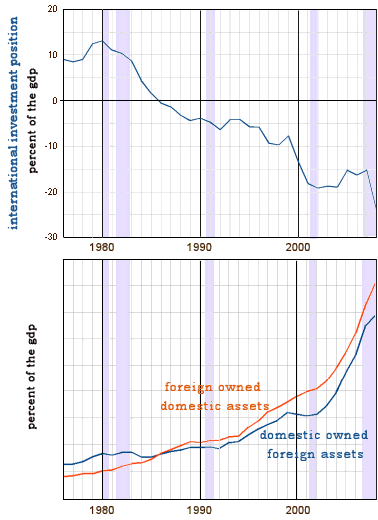
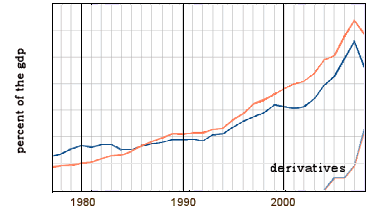
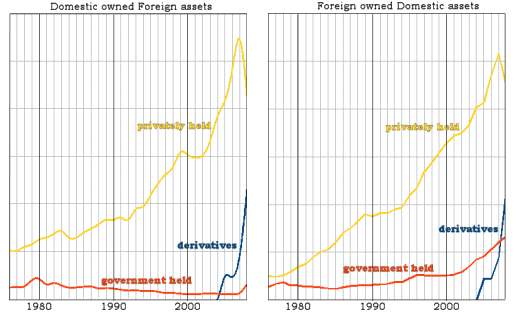
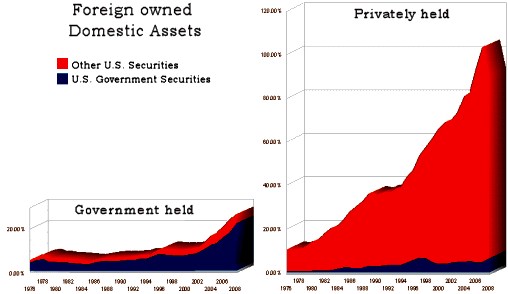
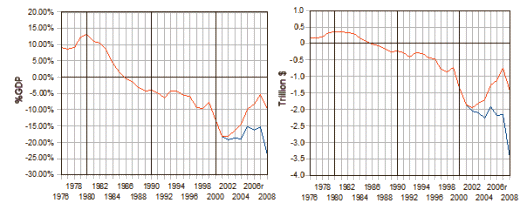
The day Hasan proposed prosecuting his own patients for war crimes was the day he should have been relieved of duty – irrespective of his obligation, his cost to the Army, or any other mitigating circumstances. All the other things that were overlooked are understandable, but not that. Whoever made the decision to not grant his request, and then didn’t follow through to make sure he saw no other soldiers from that day forward was not thinking clearly – and needs to be removed from duty as well. That was not just a red flag. That was a desperate cry for immediate action…
The Army has had a fretful and complex relationship with psychiatry for as long as there has been psychiatry as a professional discipline. The Army just doesn’t know what to do about psychiatry, partly, I think because the outputs don’t fit neatly into boxes, data flows, decision trees, quick solutions, ready answers and the quick fix. The idea that a uniformed corps of volunteer psychiatrists is a good one is, I think, arguable on many levels. As disruptive as it was, the Berry plan, (the draft for that matter), ensured a level of quality in the system. The idea that the uniformed services are competent to grow their own psychiatrists is laughable on the face of it…at the very least it is a very bad idea. I don’t know what the chain of command particulars were in this story but I won’t be surprised to learn that ditzy protocol or the artificialities of military social organization will underlie the “reasons” that this case was so tragically botched.
My own earliest experiences with psychotherapy were in trying to help my own patients with their psychological problems, because they were unwilling to seek mental health care. There was one psychiatrist who was one "of us," [a draftee] who understood the conflict and would come over and see my patients in my office with me so we didn’t have to record a mental health visit [working with him was actually part of the reason I changed specialties and became a Psychiatrist myself]. I was impressed with how helpful he was.
I suppose the loyal Fox News watchers don’t much care about how factual the reporting is. I doubt the even know about the one from last week unless they happened to watch Hannity’s apology. Frankly, I’ve gotten tired of even following Fox and Beck and Rush and them. They’ve done their damage and rallied their loyal forces. But it’s all too boring to keep up with as a steady diet. I just ran across this on TPM and thought it was an interesting testimonial to their bias. Even after last week’s shaming by John Stewart, they’re still at it.